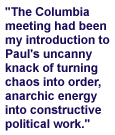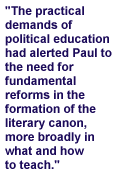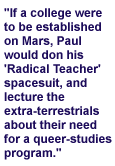|
|

1. It is a truth commonly acknowledged that the academic study of language and literature has been corrupted by the demons of political correctness, feminism, and a tsunami of insidious left-wing and populist ideologies. Less often acknowledged is the central role Paul Lauter has played in this conspiracy to cheapen our cultural capital. True enough, Lauter's career has been, in his own words, "reasonably conventional." A smart Jewish boy from New York, he graduates from the Bronx High School of Science, then gets his bachelor's degree from New York University; after a masters at Indiana University's School of Letters, he climbs the academic ladder to get a doctorate at Yale in 1958, at the time the papal seat of the New Criticism; while at Yale he learns "how to dress Blue," to use his own eloquent words. Over the years Lauter goes on to hold various academic positions, some less prestigious than others, publishes learned articles on the likes of Emerson, edits the important collection Theories of Comedy, is appointed to a prestigious chair at Trinity College (Connecticut), and ascends to the presidency of the American Studies Association. I know for a fact that he made his mother proud, even though he didn't become a real doctor.
2. However, as one scans Lauter's C.V., some cracks begin to appear in this seemingly flawless narrative. In 1963 he leaves an assistant professorship at Hobart College to become Director of Peace Studies for the American Friends Service Committee in Philadelphia. In 1965, leaving yet another assistant professorship, this one at Smith College (why no promotion, one wonders), he once more takes up peace education with the American Friends Service Committee, now at its Chicago office. Peace studies, to my knowledge, is not a recognized academic field. Is this what a Yale doctorate in English should lead to? There is more to make one feel suspicious. In 1963 Lauter participates in the notorious Chester, Pennsylvania civil rights marches, then travels to Mississippi in 1964 and again in 1965 to work with the Freedom Schools and on a campaign for school integration, marches by his own admission "some of the way from Selma to Montgomery," and gets arrested for demonstrating at the Alabama state house. That partial list of academic transgressions is merely prologue. As events in the 1960s and early 1970s became more heated, Lauter becomes involved in Students for a Democratic Society, lands support to draft resisters opposing the war in Vietnam, gets fired from the University of Maryland in Baltimore County for leading a sit-in, does a stint as Executive Director of the U.S. Servicemen's Fund (an organization lending sustenance to military personnel opposing the war), and helps found the New University Conference, a transparently subversive phalanx of radical academics dedicated to shaking the foundation of our centers of humane, and not as humane, learning. I could continue this doleful litany, but, learned readers, you get the point. Why, you may wonder, wasn't Lauter preparing his dissertation ("Emerson's Rhetoric") for publication? The answer seems obvious, but I'll try to enlighten those minds turned excessively devious from exposure to certain trends in modern criticism by citing an impeccable source--myself.
3. Lest readers suspect me of being an unreliable narrator, I'll discard the ironic mode Paul's contemporaries at Yale might have appreciated, though more likely misunderstood. I first met Paul in 1967 at the Columbia University faculty club. At the time he was director of the first community-controlled school project in the country at the Morgan School in Washington D.C. The occasion was a meeting called for the purpose of starting a national organization supporting draft resistance, desertion, and other forms of civil disobedience to the U.S.'s war on Vietnam. It was a contentious gathering of mostly self-important academic men. Paul's grasp of the political issues involved, as well as his organizational skills, saved us from the debilities of our egos, and eventually led to the formation of RESIST, an organization dedicated to the material and moral support of those resisting the war by practicing civil disobedience. Eventually Paul was asked to be the organization's national director, I his associate. At present a smallish foundation founding social change, RESIST is still going strong; both of us continue to serve on its board. The Columbia meeting had been my introduction to Paul's uncanny knack of turning chaos into order, anarchic energy into constructive political work. When many of us were ready to give up, he persisted, presenting us with new options, shaming us with his unrelenting optimism.
4. What, you might ask, does this have to do with the study of language and literature? Precisely the question many of us were puzzling over during the 1960s. How do we make our work for civil rights, against the war on Vietnam, for liberation in many areas of public and personal life relevant to our academic tasks? What, we wondered, is the relation of culture to political action? Some months after the founding of RESIST, Paul and I organized a meeting at Washington University in St. Louis to consolidate RESIST with a similar organization working on the West Coast. Paul asked concerned people at the university to participate in a discussion about relating work against the war to our pedagogical concerns. We co-chaired the meeting. Most of us had very little, if anything to contribute. Might a correct reading of Moby Dick turn students against the war and racial injustice? Would Reich's The Function of the Orgasm liberate the kids from the stultifying repression of the capitalist state? Such issues were being posed at that naive a level. Unlike the rest of us, Paul had the experience of the Freedom Schools, American Friends Service Committee Peace Education, Upward Bound in Chicago, and directing teacher training at the Morgan School in his repertoire. Such cultural work led to understanding that there "was," Paul has written, "a certain congruence between my movement commitments and the knowledge I had derived from activism, on one hand, and the needs of students and colleagues on the other." The practical demands of political education had alerted Paul to the need for fundamental reforms in the formation of the literary canon, more broadly in what and how to teach. Paul did not insult our intelligence with glib formulas about relevance, but challenged us to take a first step in reformulating what our professional lives might become.
5. The rest, as they say, is history--both Paul's and that of the movements toward a more democratic politics and culture. The changes since the 1960s in curricula, modes of discourse, pedagogy, and scholarship are some of the flashpoints for today's culture wars. Paul's contributions to these changes have been immeasurable. Over the decades he has been relentless; the guy wears me out. I won't try to compile a catalogue of his deeds and misdeeds. However, in addition to the matters I've already discussed, a few more highlights should not be ignored:
- A co-founder of The Feminist Press, Paul served its vital mission as treasurer, board member, and editor for 14 years.
- He was one of the prime movers in the MLA's small bourgeois revolution of 1968, and has maintained his involvement in the struggle to make that bureaucratic jellyfish serve the cultures of diverse constituencies.
- Co-editing The Politics of Literature with Paul in the early 1970s was for me both a hoot and a battle. Working with Paul can be a strenuous affair. But the strain resulted in a text central to the definition of the New Left's approach to culture.
- Around 1975 Paul was one of the founders of Radical Teacher magazine. He continues to be a central force in shaping its evolving engagement with education. He even wears Radical Teacher T shirts in public.
- In 1991 Paul's collection of essays, Canons and Contests, was published by Oxford University Press. Alas, it didn't hit the best-seller list, but its contents are vital for anyone considering issues relating to canon formation.
- During the 1980s and 90s Paul's essays, their subjects ranging from Any Lowell to "political correctness," appeared in journals from New Haven to Taiwan. Invariably, they managed to avoid the muddled received vision of left, right, center, as well as several other political locations.
- If a college were to be established on Mars, Paul would don his Radical Teacher spacesuit, and lecture the extra-terrestrials about their need for a queer studies program. He might also advise the graduate students about organizing a union, and probably get arrested while participating in one of their demonstrations. After all, a couple of decades earlier he had been statewide vice-president of the SUNY faculty-staff union. Until the Martians get their act together, Paul will have to put up with appearances at such ordinary locations as Tomsk Teacher's College in Siberia and the Université Ibnou Zohr in Agadir, Morocco. (I'm not making this up, honest.) His mission on these distant travels is to help teachers, scholars, and students deal with their own educational problems, while not forcing an imperial American perspective on them. The knowledge he has absorbed while performing this task has given his approach to academic struggles back home a global perspective rarely found amongst scholars of American literature.
- Finally, I come to Paul's magnum opus, that pachyderm known as The Heath Anthology of American Literature, now in its third edition. It's not just bulk. The real weight is in its contents, unlike those of any other anthology in its generous inclusion of works outside the mainstream. As significant as The Heath's contents is the process by which it came into existence. In 1982 Paul organized an institute at Yale as part of a project called "Reconstructing American Literature." Beginning with this conference, Paul organized an editorial board and over 200 contributing editors for a new anthology of American literature, one that would instead reconstruct what was to be considered American, what was to be called literature. Producing The Heath was the work, then, of a movement, not of a few editors with a publisher's contract. Organizing this movement, maintaining its focus, dealing with the needs and eccentricities of so large a number of academics was, and continues to be, a monumental task. I can't quite understand how Paul managed to do it. The need was there; it, in turn, generated the energy. What helped most, I believe, was Paul's decades of work at uniting scholarship and politics. Doing The Heath was, after all, a political task. In other hands the result could have been a dogmatic political lay-on. What we have been granted, instead, is a subtle, multi-voiced anthology which is a cultural treasure, as well as an invaluable weapon in the culture wars.
6. You might conclude that given the evidence, the charges of cultural corruption brought against Lauter and his ilk are true. But if "corruption" really signifies the attempt to make America's cultural capital more available to all students, if it implies making educational institutions more responsive to people's spiritual needs, we are fortunate to have been caught up in Lauter's indecent behavior.
7. In want to end on a personal note. Besides being a loyal friend, Paul is fun to be with. His often evident passion rarely deprives him of his antic, infantile sense of humor. What, I ask, can be wrong with a man who loves, not necessarily in the following order, jazz, Mozart's operas, Spike Jones, Louis Jordan and his Tympany Five, Mickey Katz, good food and drink, as well as his mother?
Louis Kampf, MIT

|
by
Louis Kampf

|



